The buzz you feel about a place is a collective one – it comes from within the heads of those around. Including your own. The shop had buzz. Talking buzz, loitering buzz, peeing buzz, wide-eyed, quiet, staring buzz, snacking, sneaking, ogling buzz, people-watching, jiggery-pokery, horny buzz. Violent buzz. I loved the buzz, I was the buzz.
It was a mom-and-pop shop but a sexy mom-and-pop: a couple in their early 40s, good-looking, garrulous, perfumed, twinkle in the eyes, with a hot daughter. The sari hung to the missus reluctantly but it didn’t seem an issue. The daughter wore denim jeans with cropped tops, her short rotund body spilled over, scooped up ardently by many including me. Baggy trousers were in fashion, coy exhibitionism and amorous admiration zeitgeist. The shop opened into the main drag but by virtue of flanking taller buildings it had a tucked-in feel, the cosyness, of a corner shop. Across the road was the autorickshaw stand; the drivers used to kill waiting-for-fare boredom by standing around the shop or simply with their eyes peeled towards it. If anything reversed the job of a scarecrow, the missus did it and her man didn’t seem to mind as long as it translated into business. I used to steal money from home to come here; sold coconuts carted in school bags and rubber sheets tied tightly around my torso. Those days arrack was sold openly and you were sold on the idea that to be a man you had to drink copiously. For which you had to start early.
I was on my way.
Intoxication
2002
The Kerala state government admitted to the failure of the ban on arrack. In a mea culpa mode, it said those who were at the forefront of anti arrack agitations themselves were selling it on the sly or were hand-in-glove with the sellers. Arrack, a cottage industry, continued to be made in many houses; all you needed was a pressure cooker and some tubes. It was mostly women who made it and sold it and got thrashed afterwards. The ban was largely on grounds of breeding domestic violence.
1996
Total ban on arrack imposed by the government who swept into power on the promise that they would. Women voted in large numbers – probably not the ones who made it or even those who suffered at the hands of soaks.
Circa 1990
Arrack was the transparent forebear of Coca Cola – ubiquitous. Parked in waist-high crates, they occupied pedestrian-blocking positions along pavements. The pride of place in corner shops. The air rendered giddy by their sweet pungency. You could mix it with regular or carbonated water – poured from codd bottles with glass marbles that opened with and addictive pop. The shop would always have several crates of arrack outside it and bottles of cold soda would unendingly appear from inside recesses. You could count on the shop for your buzz anytime. We all – me and the members of my high school cricket team – did.
Each day after practice we would pool in a few rupees each – the minimum bus charge was 60 paise then, its eight rupees now – muster up 10 rupees, the cost of one bottle. The contents would be mixed with a pail of water drawn from the school well and we would take turns slurping off it. Once when a huge sixer from me broke a window pane on the first floor and I was spared of chipping in: the money would be needed to pay the fine, my team mates said.
If there was any real brotherhood, it had to brew over arrack.
Titillation
I work in Delhi and I visit my hometown Pala and my folks every month. Each time I make it a point to go around taking in the changes taking over my childhood sceneries fast. I really don’t have to ‘go around’ but just look around when returning home after buying meat or milk – Pala is a small town. It gasps with FOMO looking at the development happening all around it. It pants to catch up but falters at each step. As a result we have roads that have been in the making for several years, a waste disposal solution that never saw light, old rubber dealing shops that don’t know what to do today, churches that re-annointed themselves with garish facades, schools offering different teaching systems within the same walls, people sizing up each other, longer. In short, all the lures of a hometown. The only camaraderie you will find is on the sub treasury benches during pension day. Sometimes I drop my dad there. But this is the town I grew up in, largely. It gave me everything I needed to grow up, including cunts. I love this place.
A boy needs two cunts – one to come out of and another to grow out of the one he came out of. For me the second one was provided by the shop. Rather I imagined this provision. I am sure I wasn’t the only one whom the missus made a man; I can vouch for most of my cricket team. Her nylon sarees were see-through and with some imagination thrown in she could be your own Garden Vareli model. When she reached up for a banana or bent over the cash till, you could weave an entire centrespread. The missus was kind too – she would take her own sweet time to pat her drape back into position.
Full charge.
Adventure
The township began as a yeoman paradise: there was the Meenachil river which made the land fertile, natives for whom booze-manufacture was second nature and women who never tired of giving birth. Individually households always distilled their own alcohol – a tradition which went back centuries. The only difference was that the hard labour undertaken during the day topped with the liquor afterwards fired the groins and you were gone within 11 minutes. Today there is no hard or any labour and your testicles are alight through the day. The shop fanned it – and doused it to an extent too. It was a great business model. I used to look at the man behind it with admiration. Not for his business acumen but for his reputation.
He came to town as a villein and worked his way up. He had to beat many opponents while seducing the missus and impressing her father. This included once running to the hospital trussing his own intestines around his arms which were exposed by a nasty gash inflicted by a long blade. I would always try and engage the man in subtle conversational topics like accidents and hospital access hoping to make him open up about his run with guts. I wanted to know how it felt like. Smelt like. He would look lustily at the missus always hovering somewhere around and smiled like he’d do it again. He was my hero and she my Helen.
Well, sort of.
Romance
Church attendance was the tried and tested way of advertising your fuckability. I had lots of it as I went everyday. This was way before priests began ratting out on you. Not that it mattered to me anyway. I would make it a point to make my confession worth the hearing – the poor soul behind the matted box had a life too. Guys coming out of churches would be noticed by the women and taken (in) as sin-worthy. After all, there were confessions to clear the slate later, let’s slake together. Enhancing my worth in my own eyes was my lucubration which was followed by the morning mass – it gave me top positions in class which my mother incessantly bragged about and endowed me with an attitude which made me irresistible to the opposite sex. As I fervently hoped. To be honest, I had my fair share of romance on the way to and back from church. But these ended when the mothers caught up or brothers waited. The only non-itinerant one I could shower my affections on was the daughter in the shop. She responded to my overtures – as she did, allegedly, to those of the rest of my cricket team. We speculated she looked favourably at some of the younger autorickshaw drivers too. But my love was vast like the Vembanad unscathed by little bunds of jealousies. And I was suitably rewarded: one night she agreed to meet me in a narrow alley between the shop and the building behind it. But it was too short-lived a romance to remember vividly. In fact, it was over the same night.
Passing by the shop the other day during my monthly visit, I saw it was being demolished. All these memories came tumbling out like termites when you accidentally step on their mud tunnel. Randomly. I looked at the area where the arrack crates used to be stacked, where we used to hang around smoking and shooting breeze, where the man sat counting out money, where his missus stood, nonchalantly. I recognised some of the autorickshaw drivers who had gotten older, like me. Among them was the guy who walked in on us that night behind the shop.
I think he winked at me.


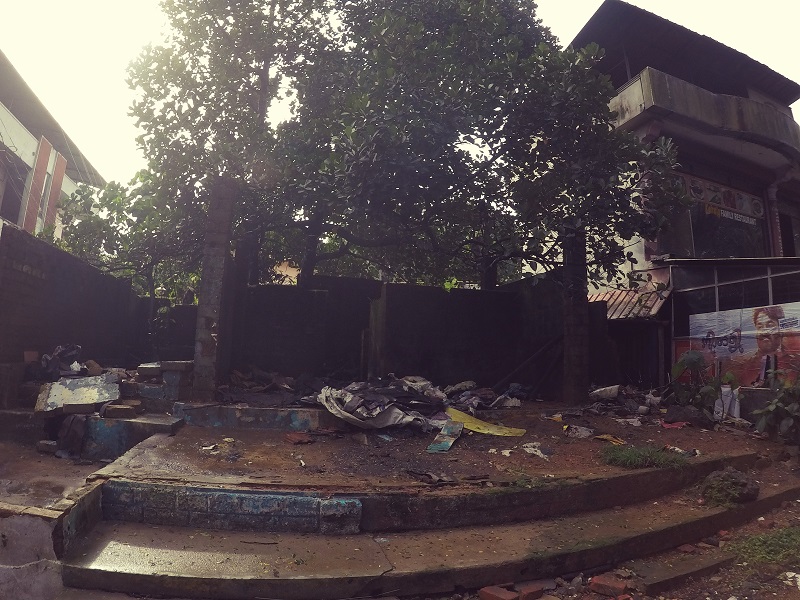
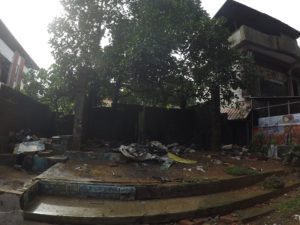
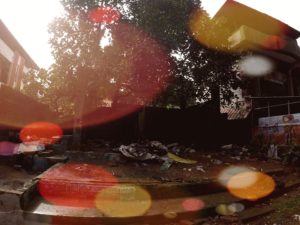
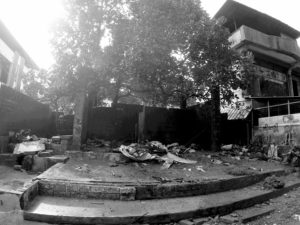
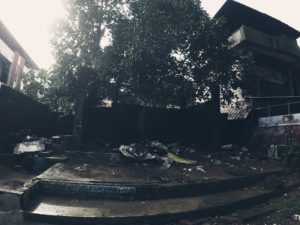
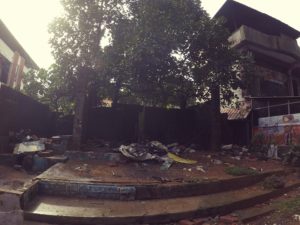


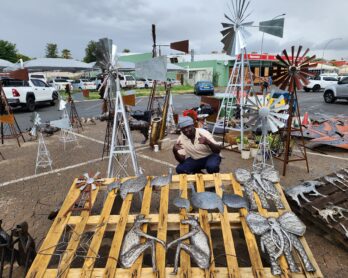




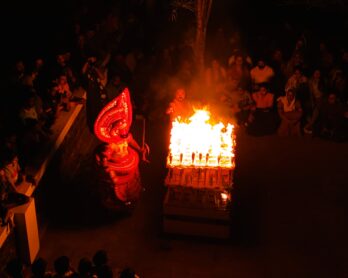
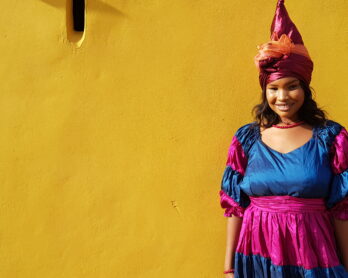
Amazing story in this article